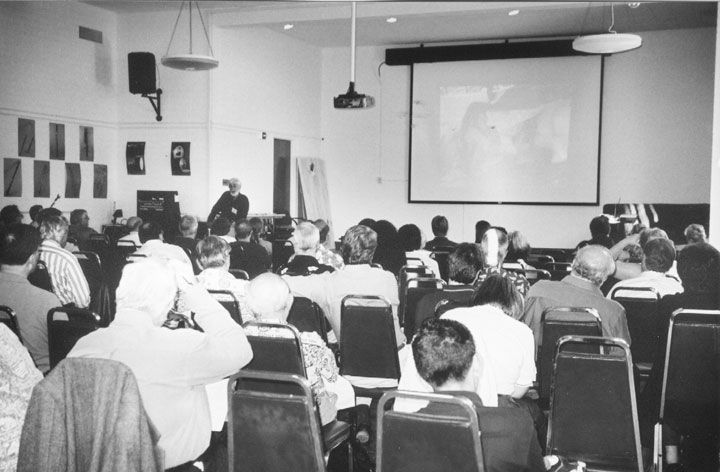Other speakers at the conference included Ron Block, International Service Chair for RI District 5240. One of the questions posed to the audience was what good does it do to extend a persons lifetime by 20 years if a persons living conditions are not also improved? Mr. Blocks talk focused on the impact poverty has on children . He stated that child abduction and trafficking affect over 11 million children each year. Michael Woodard, from the Center for Development in Central America, spoke on the Jubilee House Community, a non-sectarian group that is working in Ciudad Sandino, Managua, Nicaragua and the considerations that need to taken into account when working with impoverished people.

|
Local Rotarians listened to a variety of speakers at the Fourth Annual Conference on Poverty conducted by Rotary International District 5240 at CSU Channel Islands. Above, Michael Woodward speaks on the difficulties in establishing sustainable development in Nicaragua. Photo provided |
Local Rotarians attend conference on poverty
November 30, 2005
Santa Paula News
Four members of the Rotary Club of Santa Paula, Joe Jauregui, Bruce McGee, Arnie Dowdy, and Pam Lindsay, recently attended the Fourth Annual Rotary International District 5240 Conference on Poverty held at CSU Channel Islands. The conference was held in conjunction with Rotary Internationals (RI) Foundation Month.
Conference chairperson and keynote speaker, Jan Lindsay, stated that RI is dedicated to eliminate the cycle of poverty in the world. RI is recognized by many world governments and organizations as having the ability to monitor their resources effectively in providing assistance through out the world. One of the main reasons for the effectiveness is the direct involvement of Rotarians in a vast number of projects that include housing in the Philippines, polio eradication in countries such as India, fresh water in rural villages in Mexico, and many other projects throughout the world.David Theis, Senior Advisor on United States Affairs of the World Bank, spoke on the World Bank. Owned by 184 member governments, with the United States as the largest shareholder, the World Bank is dedicated to opening markets, increasing economic growth, and improving the quality of life in poor and middle-income countries, with the goal of creating a cycle of growth and wealth throughout the world. The world bank is the biggest financier in the developing world of basic health, education, nutrition, and environmental protection programs. The bank does not just hand over money, financing is conditioned on countries taking clear and measurable steps to open their markets and reform their economics. In 1996, the World Bank recognized that corruption was an economic problem and not just a political program and the level of corruption became an indicator in the level of assistance the World Bank would provide.J. Edward Fox, Assistant Administrator for Legislative and Public Affairs for U.S. Agency for International Development (USAID), spoke on the various programs sponsored by USAID and how the agency invests its funds. USAID was the first agency any country established to improve global living standards. It operates in over 100 countries, providing assistance through more than 70 field missions located in four regions: Latin America and the Caribbean; Sub-Sahara Africa; Europe and Eurasia; Asia and the Near East. The budget for USAID in the Fiscal Year 2005 was $11.7 billion and represents less than one half of one percent of the U.S. federal budget. These foreign assistance funds enable USAID to provide global leadership in international development.


